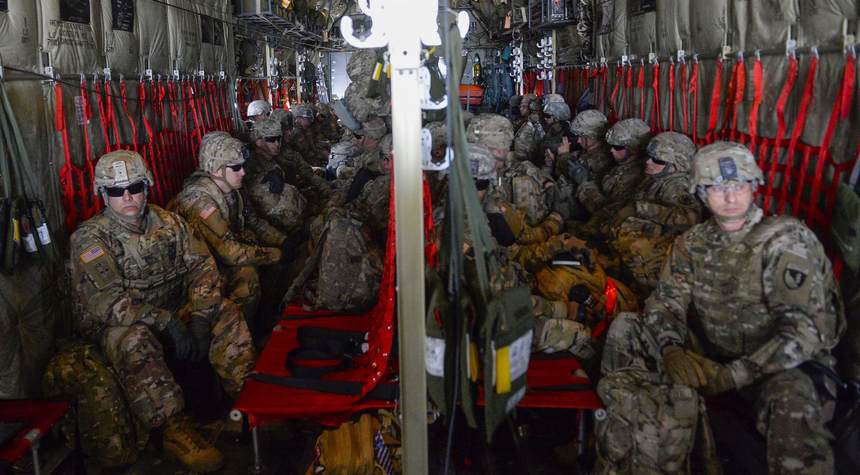U.S. Forces Secretly Deployed to Taiwan to Shore up Defense Against China
More evidence about the forward thinking of the Trump administration is being revealed. This only serves to heighten the awareness of how precarious our foreign affairs are under a President Joe Biden.
The Wall Street Journal released information on some secret operations:
A U.S. special-operations unit and a contingent of Marines have been secretly operating in Taiwan to train military forces there, U.S. officials said, part of efforts to shore up the island’s defenses as concern regarding potential Chinese aggression mounts.
About two dozen members of U.S. special-operations and support troops are conducting training for small units of Taiwan’s ground forces, the officials said. The U.S. Marines are working with local maritime forces on small-boat training. The American forces have been operating in Taiwan for at least a year, the officials said.
Were we still under a Trump administration, this would be comforting news. With the botched Afghanistan withdrawal and the continued craven malfeasance of the nation’s military leadership, Americans should be rightly concerned about more of our elite fighting men being used as political pawns.
The U.S. special-operations deployment is a sign of concern within the Pentagon over Taiwan’s tactical capabilities in light of Beijing’s yearslong military buildup and recent threatening moves against the island.
Taiwan and U.S. officials have expressed alarm over nearly 150 flights near Taiwan in the past week by Chinese military aircraft. The Chinese aircraft have included J-16 jet fighters, H-6 strategic bombers and Y-8 submarine-spotting aircraft and have set a record for such sorties, according to the Taiwan government.
China is obviously flexing its muscles and showing its intent to take over Taiwan, no matter what the conventional wisdom indicates. The article says that the nation has been conducting sorties of J-16 jet fighters, H-6 strategic bombers, and Y-8 submarine-spotting aircraft near Taiwan during the past week. At least 150 instances have been recorded by the Taiwanese government.
The Chinese Communist Party considers Taiwan a part of China, and plans to take control of the island by any means necessary.
Top U.S. military officials testified earlier this year that Beijing is likely to try to use force in its designs on Taiwan within the next six years. Other officials have said China’s timeline could be sooner than that.
Taiwan’s defense minister, Chiu Kuo-cheng, warned Wednesday that China would be able to launch a full-scale attack on Taiwan with minimal losses by 2025.
It is a chilling concept that Taiwan could indeed fall, increasing Chinese dominance and military might. The fact that we have had troops stationed there for about a year indicates that this was a Trump administration-era decision reflecting his fortified stance toward China and its policies.
The Trump administration loosened rules that restricted contacts with Taiwan by U.S. officials, in a move that was applauded at the time by Taiwan officials. The restrictions limited U.S.-Taiwan exchanges to avoid provoking China.
The Biden administration has continued with some of its predecessor’s moves, sending a U.S. delegation to Taipei in April.
Before leaving office, the Trump administration declassified the U.S. Strategic Framework for the Indo-Pacific, a 10-page document broadly outlining objectives for the region.
The fact that the Biden administration and its woke military leaders have not pulled the plug yet on this operation indicates that someone within the Pentagon has some common sense, and understands what may be at stake. An even more fortified China means more funds and resources toward ISIS/Al Queda 2.0, and the newly-installed Taliban regime in Afghanistan.
The special-operations unit and the Marine contingent are a small but symbolic effort by the U.S. to increase Taipei’s confidence in building its defenses against potential Chinese aggression. Current and former U.S. government officials and military experts believe that deepening ties between U.S. and Taiwan military units is better than simply selling Taiwan military equipment.
The U.S. has sold Taiwan billions of dollars of military hardware in recent years, but current and former officials believe Taiwan must begin to invest in its defense more heavily, and smartly.
“Taiwan badly neglected its national defense for the first 15 years or so of this century, buying too much expensive equipment that will get destroyed in the first hours of a conflict, and too little in the way of cheaper but lethal systems—antiship missiles, smart sea mines and well-trained reserve and auxiliary forces—that could seriously complicate Beijing’s war plans,” said Matt Pottinger, a distinguished visiting fellow at Stanford University’s conservative Hoover Institution who served as a deputy national security adviser during the Trump administration.
At present, the Biden administration appears to be allowing this strategy to stand.
The document hasn’t been supplanted by a new Biden administration strategy, nor is it technically being implemented. Biden administration officials have acknowledged that there are areas of continuity between the two administrations on China policies.





Post a Comment